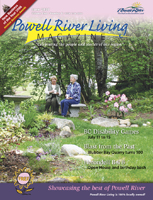June 2007
Table of Contents
In this Issue
Special teacher retires
Brain injury awareness month
Stanley and the Brainiacs
Success is more than a word
See the person not the disability
A taste of Vietnam
Model Community employment program
About French Immersion
The Music of SOAP
Gardeners — Caretakers of memories
Summer activities in Powell River
Exploring the history of Desolation Sound
Reviewing Desolation Sound: A History
BC Disability Games overview
Local equestrians compete
Emily Anderson: Games competitor
Going Green
The truth about plastic bags
Father’s Day
BC Seniors’ Games
In every Issue
Family Matters
Blast from the Past
Blubber Bay Quarry turns 100
Explore Powell River
In Business
Herondell B&B celebrates 20 years
Business Connections
Community Calendar
Faces of Education
 One for all and all for one
One for all and all for one
Not long ago a woman I’d just met was extolling the virtues of Powell River. She’d recently moved here and was so impressed by all this community had to offer.
As I listened to her talk about what we call home, I found myself nodding in agreement with her.
Powell River has so much to offer for so many different people. I know it isn’t perfect—there are still some areas that need improvement, but it is still a pretty fabulous community to call home.
Just what is it that really makes Powell River so special?
If I had to describe our community in one single word I’d say inclusiveness.
Have you ever visited a place where you felt like you didn’t belong? Like you weren’t good enough? Rich enough? Pretty enough? Smart enough?
I know I have. I’ve felt and still to this day feel uncomfortable in some settings. Sometimes I can pinpoint the reasons why. Sometimes I can’t. Sometimes it’s my own insecurities making me feel uncomfortable; sometimes it’s the setting or the premise of the function.
What I love about Powell River is that there is something for everyone. As a community, we strive to include everyone. You don’t have to look very far to see what I mean. There’s the Powell River Association for Community Living, Powell River Model Community, Disability Games, School District 47, our many churches, non-profit organizations, the Brain Injury Society, our wonderful warm hearted citizens and the list goes on.
As a community I believe that we recognize the importance of everyone. I don’t know many perfect people living perfect lives. We all have warts; it’s just that you can’t see those warts on everyone. We all have hearts, it’s just that some of us wear our hearts on our sleeves while others keep theirs locked up because they’ve been hurt too many times.
We are all unique and all special. What makes me, me and you, you is that we are different. We think differently, we act differently. We’re passionate about different things and we want different things out of life. Yet despite our differences we all need to belong, we all need to be loved; we all need to know that we are needed.
Every day I learn something new about my community and every day I learn something new about myself. Powell River is a reflection of the people who live here. It is a reflection of our values, our beliefs and of ourselves.
You see it in business, the types of restaurants we have. You see it in education. You see it in sports, homes and leisure activities.
We can and we do reach out. We have passions and visions that allow us to provide choices for people, that allow us to create programs that fulfill special needs.
If you’re looking for an exclusive club or exclusive community where you have to be perfect, I’m afraid Powell River isn’t the place for you.
You see, Powell River is inclusive, not exclusive.
Forty years of teaching and guiding students
Sister Michelina set to retire
By Mimi Richardson, Sister Claire and Charlene Cantryn
You can’t help feeling the fascination of a soul that knows what it wants and lives by faith. (Pope John XIII)
Sister Michelina has been teaching at Assumption School for 40 years. When she retires from teaching grade two students at the end of June, it will be the end of an era. She will say goodbye to a long and caring teaching career in which she has made a tremendous difference. This kind and gentle nun who is known for her strong faith, her sense of humour, and her love of children and animals will be sorely missed.
 At the Catholic Educators Conference in Vancouver earlier this year, several teachers from an audience of over one thousand were recognized for 25 years of teaching. “Then one teacher from Powell River was called up to the stage to be recognized for 40 years of teaching. The audience let out an audible sigh and when Sister Michelina received her award the entire place erupted into a standing ovation. She was a celebrity for the rest of the conference being congratulated by various superintendents and presenters,” said Assumption School principal Mimi Richardson.”
At the Catholic Educators Conference in Vancouver earlier this year, several teachers from an audience of over one thousand were recognized for 25 years of teaching. “Then one teacher from Powell River was called up to the stage to be recognized for 40 years of teaching. The audience let out an audible sigh and when Sister Michelina received her award the entire place erupted into a standing ovation. She was a celebrity for the rest of the conference being congratulated by various superintendents and presenters,” said Assumption School principal Mimi Richardson.”
When Sister Michelina first arrived in Powell River from Malta in 1962 she and six other women lived in seven tiny rooms in what is now the multipurpose/band room at Assumption School. “The parish had found the money and the volunteers to build the school but with little funding from the ministry they had no way to staff it. Maltese parishioners said to write away to the Missionary Sisters of Jesus of Nazareth in Malta and they will send you teachers,” said Richardson.
So they did and seven women arrived in Powell River.
Sister Claire has taught at Assumption with Sister Michelina for many years. “Sister Michelina has not only helped the children but she has also helped the parents who came to ask for her advice. Thank you Sister for all that you have done for all those you come in contact with.”
Richardson first met Sister Michelina in 1981. “She was the grade two teacher and I was in my first year teaching. I was a long way from home, family and friends.”
Richardson recalls how delighted she was when the Sisters invited her to have dinner with them. “They welcomed me into their home and fed me what I thought was a beautiful chicken dinner. My memory of that first evening included the fits of laughter from Sister Michelina when she told me I had just eaten rabbit and that no they did not change into their blue jeans when they got home from school. Sister’s sense of humor, her wit and encouragement will be sorely missed around this school.”
Both of Richardson’s children had Sister Michelina as their teacher and she prepared them for their first Holy Communion. “When I asked my 17-year-old son who is now in Grade 11 what he remembers about Sister he said: “She was always here for us when something important was happening. She was always doing what she loved and what she believed in, always close to religion but free enough to have fun.”
Charlene Cantryn had Sister Michelina as a teacher at Assumption School 20 years ago and her daughter, Amelia, had Sister as her teacher two years ago. Cantryn feels blessed that both she and her daughter had the opportunity to be taught by this wonderful woman.
“It’s the fascination and admiration one feels towards another person that inspires us to strive to be a better person. Sister Michelina’s devotion to the Catholic faith and how her faith is put into action makes me admire and want to honour this woman.”
Cantryn attended Assumption School many years ago but now that she’s a mother she truly realizes how fortunate she was to have Sister as her teacher.
“The strongest impression that stayed with me is Sister’s gift of nurturing and caring for her students. She had a way of making me feel loved, accepted and secure. Each year for 40 years, Sister has devoted herself to organizing and preparing the young children for their first Holy Communion. Many children will remember this beautiful ceremony for a lifetime. One of the many reasons I decided to enroll my children in Assumption School is my fond memories of all the nuns and how they cared for the children.”
Cantryn’s daughter, Amelia, has been blessed to have Sister Michelina as her teacher and as a role model in both grades two and three. “With a smile in her eyes, I remember Amelia coming home from school and saying: “Mom, I sure like Sister Michelina.’ ”
In the twilight years of Sister Michelina’s career, Cantryn treasures being able to relive the experiences through the eyes of a mother and watching her daughter receive the love that she knows will last a lifetime.
“As I reflect on my own life and I ask myself how can I help or guide others in the gentle and committed way that Sister Michelina has?”
Blubber Bay Quarry’s party
Historic business celebrates 100 years
By Gary Grieco
Blubber Bay Quarry has influenced Texada Island economically and socially since 1907 when the Blubber Bay Lime Syndicate was formed, initiating a mining legacy that would continue unbroken into the next century. The quarry’s name evokes images of stout ships and hardy sailors, like Elijah Fader, who was reported to have been the last sea-going hunter to cut up whales for their oil in Blubber Bay, 17 years earlier. But on this grey, damp, 1907 dawn, twenty mine workers trudged along its sandy shores, with their thoughts not on whales or the piles of white bleached bones on the beach, but of the hard day’s labour ahead of them. Their destination was a ten-ton-a-day lime kiln they had been building, block by stone block, for almost a year.
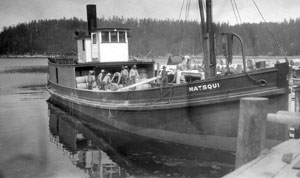 The lime business was improving, and in February 1910, the Blubber Bay Syndicate formed the Vancouver-Texada Lime Co Ltd in order to raise capital. A few months later, this company was voluntarily wound up, and on June 11, 1910, Pacific Lime Company was incorporated. Blubber Bay effectively became the capital of Texada after WWII when the prices of copper and gold declined, and Van Anda went into a deep recession. By contrast, Pacific Lime had a stable operation with a work force of 60 Caucasians, 60 Chinese, and an office staff of ten. They operated the quarry until 1955 when it passed into the hands of Gypsum Lime and Alabastine Canada Ltd, and then sold to Domtar Chemicals in1956. Oregon Portland Cement acquired the quarry in 1983, and a year later it was merged into the current owners, Ash Grove Cement.
The lime business was improving, and in February 1910, the Blubber Bay Syndicate formed the Vancouver-Texada Lime Co Ltd in order to raise capital. A few months later, this company was voluntarily wound up, and on June 11, 1910, Pacific Lime Company was incorporated. Blubber Bay effectively became the capital of Texada after WWII when the prices of copper and gold declined, and Van Anda went into a deep recession. By contrast, Pacific Lime had a stable operation with a work force of 60 Caucasians, 60 Chinese, and an office staff of ten. They operated the quarry until 1955 when it passed into the hands of Gypsum Lime and Alabastine Canada Ltd, and then sold to Domtar Chemicals in1956. Oregon Portland Cement acquired the quarry in 1983, and a year later it was merged into the current owners, Ash Grove Cement.
Blubber Bay was always a company town, and had a typical one-room school in the 1930s—half-dozen rows of seats, ranging from Grade 1 to Grade 8, and a wood stove for heat. 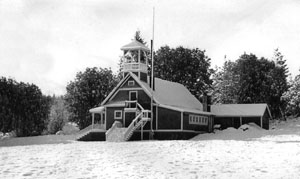 Ringing the school bell in the tower was a much sought-after privilege. It was the ship’s bell from the original Empress of Japan, and reputed to weigh over 600 pounds. It could lift a child on the end of the rope with its momentum. The social life of the community revolved around the school, which doubled as a community hall and gathering place for community events such as Friday night card parties, Saturday night dances, and Sunday church services. There are wonderful recorded memories of silent movie nights, when Charlie Chaplin and Pearl White were shown free of charge for the children and ten cents for adults.
Ringing the school bell in the tower was a much sought-after privilege. It was the ship’s bell from the original Empress of Japan, and reputed to weigh over 600 pounds. It could lift a child on the end of the rope with its momentum. The social life of the community revolved around the school, which doubled as a community hall and gathering place for community events such as Friday night card parties, Saturday night dances, and Sunday church services. There are wonderful recorded memories of silent movie nights, when Charlie Chaplin and Pearl White were shown free of charge for the children and ten cents for adults.
The company general store built in 1928 had no competition—no supermarkets or daily freight, and no consumer co-ops or easy communication to the outside world. The postmaster/store manager had a position of authority in the community and reigned like a prince—his castle moat being the long counter separating his stock from the public. Goods from the company store were usually bought on credit by company workers. The company superintendent would take note on ‘boat days’ which employees were receiving extra large orders from elsewhere and they would be told, “The company store also sells those items.”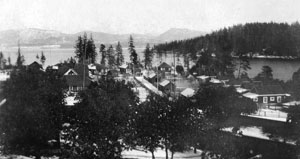
Company houses were laid out within identical grids, each lot having a garden plot and woodshed, which also contained the outhouse. They were expected to be maintained by the employee, and rent in 1958 was $16 a month. Chinese workers were quartered in two basic bunkhouses, situated on the eastern boundary of the property.
In May 1949, Mae Webb visited the limestone quarries in Blubber Bay and reported in the Powell River News that, “It’s a unique spot in that half the town is the property of Pacific Lime Company, (the larger operation), and the other half is owned by BC Cement. The two companies live and operate side by side in complete harmony.” She went on to describe the now abandoned Glory Hole number 1. “A huge excavation, 300 feet deep and at least as wide across the top, shaped like a giant cup. At the bottom is an accumulation of surface water. It is the most beautiful turquoise blue imaginable.” Some believe that ghosts of the Chinese workers, who scaled the 365-foot limestone wall on rickety wooden ladders twice a day, still linger.
 Marine transportation was the only way to get from the island to other coastal points. From the earliest days Union Boats and CPR steamers Charmer, Princess Royal and Princess Mary provided a weekly connection between Blubber Bay, Comox, and Vancouver. They could arrive any time day or night, and in the 1950’s would broadcast their schedule on Spilsbury radios. They would announce their arrival with a piercing shriek. The CPR’s Princess Mary, now a restaurant in Victoria, had a distinctive whistle of one long and one short. In 1955 the inauguration of the Atrevida, a small car ferry, brought regular service between Blubber Bay, Van Anda, and Westview. The little ship served for 14 years.
Marine transportation was the only way to get from the island to other coastal points. From the earliest days Union Boats and CPR steamers Charmer, Princess Royal and Princess Mary provided a weekly connection between Blubber Bay, Comox, and Vancouver. They could arrive any time day or night, and in the 1950’s would broadcast their schedule on Spilsbury radios. They would announce their arrival with a piercing shriek. The CPR’s Princess Mary, now a restaurant in Victoria, had a distinctive whistle of one long and one short. In 1955 the inauguration of the Atrevida, a small car ferry, brought regular service between Blubber Bay, Van Anda, and Westview. The little ship served for 14 years.
Island transportation was primitive. A wagon road was put through from Blubber Bay to Van Anda in 1910 to deliver the mail, but it retained its deer-trail status right up until the mid-fifties. The first car did not appear on Texada until 1925, and Maury Liebech growing up in Blubber Bay recounts how, “My father always had a car, but we only might make the trip from Blubber Bay to Van Anda twice a year, at Christmas and Easter.”
Blubber Bay Quarry is still an active mining company, but the ‘little community that was’ has disappeared. All that remains are a few former company houses, which are now home to the Texada Heritage Museum, Holtenwood Gallery, and Manyana Shop.
Blubber Bay Quarry is a member of an elite club. “It is one of six Canadian mines with the distinction of continuously operating for 100 years,” according to present-day mine manager Ted Thomson. “It’s an honour, but I don’t know if we will ever catch up to the Wieliczka salt mine in Poland, where mining began in the 13th century and has never stopped.”
Herondell B&B celebrates 20 years
By Isabelle Southcott
When Nancy and Alex Hollmann stand still long enough to look back over the years, it’s hard to believe that they will be celebrating their 20th anniversary of operating Herondell Bed and Breakfast next month.
 Chris McNaughton, president of Tourism Powell River is impressed by the fact that the Hollmann’s have run a successful bed and breakfast for 20 years. “The longevity in the industry would be on average about five years,” he said noting that many people who open a bed and breakfast are nearing retirement age and looking for an income supplement. “But as the industry changes more and more early retirees are buying or building their dream home, leaving the workforce but still looking for something to keep them active and the bed and breakfast industry is the home based business of choice.”
Chris McNaughton, president of Tourism Powell River is impressed by the fact that the Hollmann’s have run a successful bed and breakfast for 20 years. “The longevity in the industry would be on average about five years,” he said noting that many people who open a bed and breakfast are nearing retirement age and looking for an income supplement. “But as the industry changes more and more early retirees are buying or building their dream home, leaving the workforce but still looking for something to keep them active and the bed and breakfast industry is the home based business of choice.”
When I visited the Hollmann’s recently, Alex was hard at work building a new outdoor stage on their tranquil 43-acre woodland property south of town in preparation for the anniversary party they’re planning for July 28.
It is easy to understand the magnetic draw to Herondell. The peaceful setting, the interesting and unusual treasures, such as the charming gazebo overlooking Lake Mercedes or the tree full of holes made by a Pileated woodpecker in their beautiful woodland property.
The Hollmann’s first guest was a German doctor who was hitch hiking around BC. “He stayed here for three days—he was doing the circle tour,” Nancy recalled.
Nancy originally purchased the property in 1966 because it was a wonderful piece of property and she loved it.” She later bought her ex-husband out and started taking in boarders, as she needed a source of income. “My brothers suggested running a bed and breakfast with boarders. I had four boarders who stayed here and it really helped.”
Nancy and Alex were married three years later and it was then that they began developing the property in earnest. “Alex is German and there’s a German tradition of having everything neat and clean,” she laughed.
Alex moved the chicken house, changed the fences, made the garden bigger and put edges on the flowerbed. One day Nancy’s brother called from Oregon and asked if they’d like 100 rhododendrons. “He said they were free, all I had to do was pay the gas to get them here.” Nancy ended up with fifty rhododendrons which kick started her rhodo garden. “Now we have over 100 rhododendrons and azaleas.”
The Hollmann’s inviting home has been the site of many musical parties. Both Nancy and Alex share a love of music—Nancy taught for many years, and conducted the Powell River Community Choir. Their bed and breakfast has three rooms. One is a two-room suite, and each room has its own bathroom.
A walk around the property is a bit like taking a stroll through a magic garden. There’s the chicken house with its bevy of laying hens and never-ending supply of fresh organic eggs. The first of three ponds you come across is an old beaver pond and is hundreds of years old. The second pond, behind the house, is affectionately known as Lake Mercedes. “Alex wanted a Mercedes and I wanted a pond,” Nancy explained.
A walk past Lake Mercedes and the pretty gazebo along a footpath through woods dappled in late afternoon sunshine leads to the mighty roar of Eagle River. Further on is a collection of unusual looking structures and wire ropes. “Christine, Alex’s daughter, uses the property for the adventure tourism program,” Nancy explained.
Alex is in charge of cooking breakfast for the guests. “They usually have an European flavour,” said Nancy. “We raise berries, have our own apple sauce, fresh rhubarb and make our own jam.”
As Nancy looks back over the years, the memories of guests surface. “We had two couples visit once. They were older. One was from Oregon, the other from Northern California. They had a history of traveling together and planned to be here for 10 days. When they made the reservation for 10 days I wondered what they would do, but they found something different to do every single day and tried a new restaurant every single night.”
They would return at the end of the day and regale the Hollmann’s with their adventures before taking a nap and heading out to dinner. “We found out more about our area through them,” recalled Nancy. “They went to Egmont one day, to Chatterbox Falls another. They did Savary and loved the water taxi. They visited Texada. One day they did all the portages. They went to the museum and watched people at Willingdon Beach. They went hiking and beachcombing at Saltery Bay, Palm Beach, Donkersley and Myrtle Rocks.”
Nancy loves meeting people and teaching them about the ecology of the area. “I’m interested in trees and how things are supposed to grow. I love to take people on walks in the woods and tell them about trees.”
Be sure to drop by one of the first bed and breakfasts in the area on July 28 and take a walk around their lovely piece of paradise and help them celebrate Herondell’s 20th anniversary!
Change in store for Texada Elementary
Thirty years is a long time to work at one school, 38 is that much longer.
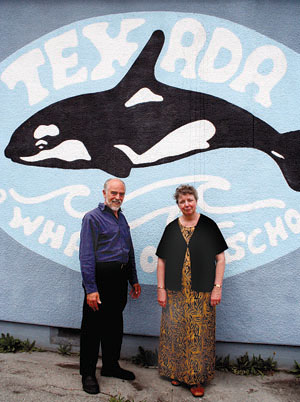 Between them, Peter Lock and Arlene Rycroft, two Texada Elementary School teachers have been at the school for 68 years. Rycroft, who is the school principal, retires at the end of this month. Carol Brown will be the new principal beginning in September while Lock will retire in October.
Between them, Peter Lock and Arlene Rycroft, two Texada Elementary School teachers have been at the school for 68 years. Rycroft, who is the school principal, retires at the end of this month. Carol Brown will be the new principal beginning in September while Lock will retire in October.
Neither one think they’re unique in having spent so many years teaching at one school. Both Lock and Rycroft acknowledge that most teachers in the district change schools periodically but for them it seems that once the magic of Texada Island cast its spell it never let go.
Well, almost never, except for one year for Lock.
“I did a one year teacher exchange in Prince Edward Island,” said Lock “but that was it.”
Lock and his wife Mary moved to Texada in August 1977 after doing a considerable amount of traveling. “While we were traveling we never found a place that was more beautiful than the west coast of Canada and I thought wouldn’t it be beautiful to live on an island.”
Lock applied for a job with School District 47 and was hired to teach on Texada. “I’d never been to Texada. Mary knew what Texada looked like from the south end because she had a friend who had a place on Thormanby and I knew about Texada from an old Beautiful BC Magazine that showed people swimming in the old quarry.”
Lock’s first night on Texada stands out vividly in his mind. “We arrived and squished dozens of frogs while driving past Priest Lake. We later found out this was a common occurrence when it rains after a dry spell.”
Rycroft began teaching in 1969 in the Peace River area. She’d been teaching for one year when she and her teacher husband (they’d been married for four months) and moved to Texada to teach at the same school but in different buildings. “We thought we’d move closer to town (Vancouver),” she admitted.
Some people seem to fall into teaching but with Rycroft it was different. “I wanted to be a teacher since I was in Grade 1 so I went to university with a plan and got an elementary teaching certificate.” She’s a charter student of Simon Fraser University as she attended the first year it opened.
Two years after moving to Texada, the Rycrofts bought a waterfront property in Gillies Bay. Before Rycroft’s husband retired from teaching in 1992, the two of them often shared the same job. “We taught part time for many years so that we could be home with the kids and run our business.”
Because both Rycroft and Lock have been at the school so long they know many of the people and students. “When you’ve been here as long as we have you have a lot of information stored in your head,” said Rycroft.
For Rycroft, the most rewarding part of being a teacher has been helping kids grow and develop their thinking. “The pleasure they experience when they are successful and when they learn something new….those kind of things thrill me,” she said.
One of the reasons Rycroft went into teaching was because she needed a challenge and variety. “I felt that no one day would be the same as the next,” she said. “Teaching is a people business so there is always change.”
Like Lock, Rycroft is proud of her little school. “We’ve done some pretty amazing things here for a small school. We all get involved and kids remember that kind of stuff.”
Each school day is started with brain gym and then the whole school listens to a piece of classical music. “We listen to the same piece every day for a week and we comment on it. Then we go on to a new piece the next week.”
Rycroft said the theory behind this is that if students hear a piece of music often enough they are more likely to like it.
Like Rycroft, Lock has been involved in many aspects of school life. He’s mainly taught the intermediate grades but has taught drama to all grades. He has been very involved in plays, skits and other productions. His love of theatre has been a constant thread both inside and outside of school. He directed the Rock Island Players play The Foreigner last month.
Lock remembers the time when Christine Woolcott was teaching at Texada and said let’s put on a pantomime.
They did a fabulous production and since that time they have put on a play almost every year.
“Mary (his wife) and I have written a few of the plays and we’ve used some commercial scripts,” said Lock.
This year the school put on Catzandogz, a collection of short stories, skits, poems and songs about… cats and dogs. Lock laughed when describing the inspiration for the production. “Every time someone mentions something that their cat did everyone else has a story about something their pet did. I thought it would be neat to do a play about pets.”
Lock finds teaching rewarding. “I enjoy being with kids. They’re full of ideas. They’re not yet weighted down by the restrictions of the adult world.” He paused. “I don’t enjoy the administrative duties though.”
In 1998 Texada School celebrated its 100th anniversary of education on Texada. The first school on Texada was called the Honeymoon Cottage because it was built for a couple who were just married.

Bugs
by Elizabeth Abbott
